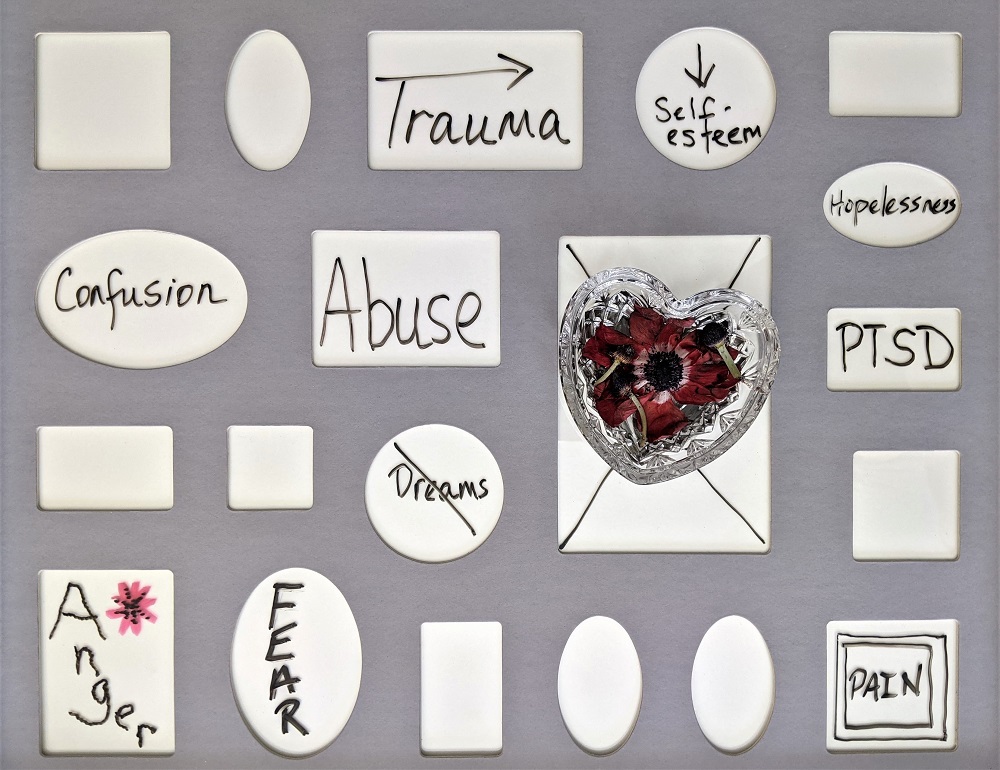By Amy Fournier
Posted on October 22, 2021

TW: This article contains descriptions of narcissistic abuse.
A brief history of narcissism
According to the World History Encyclopedia, Narcissus is a figure from Greek Mythology who was so impossibly handsome that he fell in love with his own reflection. The term narcissist, derived from this Greek myth, has been used to describe people who love an “idealized, grandiose image of themselves.”
Unfortunately, narcissists don’t often see anything wrong with the way they think of themselves and are oblivious to their own hurtful behaviour. This can impact many areas of their life including work, family, friends and romantic relationships. It is especially pertinent to highlight the way in which narcissism can contribute to domestic violence.
A recent Ohio State University study discovered a strong connection between narcissism and aggression. This research study showed that people with a high narcissistic view of themselves are more likely to behave violently, even when unprovoked. It is therefore important to take the necessary precautions when dealing with a narcissist in order to prevent becoming caught in the narcissistic cycle of abuse which involves idealization, devaluation and discarding of the victim.
Traits of a narcissist
Grandiose sense of self-importance
Narcissists feel as though they are above anything or anyone average or ordinary. They often exaggerate their talents and abilities, going as far as lying about them. Likewise, narcissists believe that others must acknowledge their superiority. In romantic relationships, this could look like constantly making the other person feel as if they are inferior and their needs come secondary.
Experiences fantasies about being influential, famous, and/or important
Narcissists often have fantasies about unlimited success, money, power, brilliance, and attractiveness. These fantasies serve to protect them against inner feelings of shame and emptiness and are a denial of reality. People who try to burst the narcissist’s fantasy bubble and have them face the reality in which they live are often met with rage and defensiveness.
Needs constant praise and admiration
A narcissist relies on constant praise and attention to fill their ego. Oftentimes, this praise is unrequited (one-sided). This can be emotionally draining and unfulfilling for someone who is in an intimate relationship with a narcissist, as the scale is always tipped in favour of the narcissist, not leaving much room for the partner’s desires to be met.
Sense of entitlement
Narcissists believe that they deserve only the best, often at the expense of others’ well-being and happiness. If you don’t meet their every need, or if you ask for your own needs to be met as well, then you are often given the cold shoulder, met with outrage, or even aggression.
Exploits others without guilt or shame
The only thing that narcissists understand is their own needs. This means that they are prone to taking advantage of others in order to fulfill those needs without feeling remorse for their actions. Narcissists lack empathy (the ability to identify with another person’s feelings), which can cause detrimental outcomes to those who may lack firm boundaries.
Bullies, belittles or intimidates others
Narcissists feel threatened by those who challenge them in any way, or who may have something that they lack. As a result of their insecurity, they may try to use contempt as a coping mechanism. Putting other people down helps the narcissist to neutralize the power and can look like name-calling, threatening, or consistent and unwanted teasing.
Dealing with a narcissist
Sometimes it can be hard to spot a narcissist right away as they appear charming and confident, which can be quite alluring. However, if you notice that your sense of self is being compromised in the relationship, then it is time to take action as soon as possible.
Set healthy boundaries
Carefully consider your goals and potential obstacles. Does this person support your goals and achievements or do they ignore or diminish them? Do you feel as if there is a power balance in your relationship? If you feel as if you are emotionally exhausted whenever interacting with this person, setting firm boundaries and prioritizing self-care is crucial to your wellbeing.
Take off the rose-coloured glasses
It’s important to see the narcissist for who they truly are and recognize that they won’t likely change their toxic behaviour. Stop making excuses for the narcissist’s behaviour and the pain it is causing you. Recognize that healthy relationships are possible outside of this person.
Focus on your own dreams
Oftentimes, partners of narcissists neglect their own desires and can even lose their sense of identity. Rediscover your hobbies and interests, and do more of what brings you joy. The best defence against narcissistic abuse is a strong sense of self.
How to leave a narcissist
Ending a relationship, whether toxic or not, can be difficult. Ending a relationship with a narcissist may be even more complicated as their personality is unpredictable and their reactions are intense. However, it is important to realize that no one deserves to be emotionally abused. There are ways to break free from a narcissist and start the healing process.
Educate yourself about narcissism
The more you know about narcissism, the easier it is to recognize the tactics that the narcissist may use to keep you from leaving. For example, “love bombing” is a technique often used by narcissists to make the victim feel guilty for leaving. Be cautious not to fall into this trap as it can perpetuate the cycle of idealization, devaluation and discarding that is common with narcissistic abuse.
Cut off all ties
The more contact you have with them, the easier it is for them to try and reel you back in. It is much safer to block their phone number and disconnect from them on social media.
Seek support
It’s possible that throughout your relationship with the narcissist they may have tried to isolate you from seeing or speaking to friends and family members. Now is the time to try and reconnect and apologize to those people in your life who you may have neglected while under the control of the abuser.
Being a victim of narcissistic abuse can be debilitating and can leave you feeling disoriented, confused and depleted. However, you are not alone and there is a way out.

